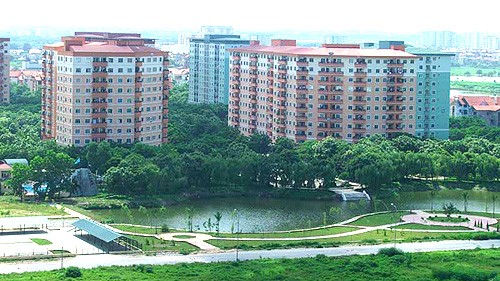(VOVworld) – Land ownership is one issue that has drawn much attention while collecting the public’s recommendations for revising the 1992 Constitution. The stipulation that land belongs to the public is suitable consistent with Vietnamese history. It will help resolve socio-economic issues and achieve sustainable development. A majority of the public support the stipulation.

The Linh Dam residential area in Hanoi |
Land ownership is an important issue which has an impact on socio-political stability. Public ownership of land in the past has helped the State mobilize land resources for economic development. Public ownership of land reflects the social and political importance of land. Land resources belong to the nation and the people. Benefits from land must be used to serve society. Doctor Do The Tung is former Director of the Institute of Economics at the Ho Chi Minh National Academy of Politics and Public Administration. “Specifying that land belongs to the public and that the State represents the public ownership is consistent with evolutional trends in regulation and modern agriculture. The State abolished absolute lend rental fees, collects differential land rental fees, and adds to that an agricultural tax which is used to reinvest in agriculture and assist disadvantaged areas.”
Public ownership of land creates an obligation for the State to protect the people’s legitimate rights. The State grants the people land use rights and imposes regulations to protect land users. Doctor Nguyen Quang Tuyen, a lecturer at the Hanoi University of Law, says in countries that allow private land ownership, the State still limits land users’ rights. In particular circumstances, the State has the right to buy land in the interest of national defense and security. If the owners won’t sell their land, the State has the right to confiscate it with compensation. Tuyen said: “Some say it’s necessary to have multi-ownership of land and land privatization. I don’t agree. Some foreign researchers say it’s better to have public ownership of land in Vietnam. Each form has its advantage. The importance is how we handle it. With public ownership of land, the State hands over authority to land users. Land users enjoy 12 or 13 rights, including the right to exchange, transfer, lend, mortgage, joint venture, and receive compensation. Land users in Vietnam have all the same rights as those in countries with private land ownership.”
Doctor Tuyen says problems related to land management and use have not resulted from forms of ownership but compensation for land clearance and corruption. Doctor Nguyen Minh Doan at the Hanoi University of Law said: “As we have been building socialism, land has been put under public ownership. Privatizing land will certainly lead to political and social instability. If we stick to public ownership of land, the Constitution should increase the effectiveness of land management and use.”
It was difficult for Vietnam during the wartime to constitutionalize an appropriate economic mechanism based on public ownership of land. With Vietnam currently on the road to socialism, this mechanism is vital as it conforms to both theory and reality. Regulating public ownership of land and addressing land management issues will protect the interests of both the State and the people.